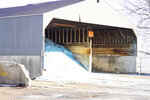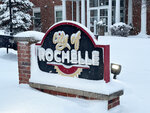The City of Rochelle Street Department combated two weeks of winter storms in January that yielded a number of school and business closures in the area.
This item is available in full to subscribers.
To continue reading, you will need to either log in to your subscriber account, below, or purchase a new subscription.
Please log in to continue |



ROCHELLE — The City of Rochelle Street Department combated two weeks of winter storms in January that yielded a number of school and business closures in the area.
The storms started with heavy, wet snow, and subzero temperatures, more snow, and high winds followed. City Street Department Superintendent Tim Isley said the order of the conditions made work difficult for his department.
“To start off we got that real wet, heavy snow, which is very difficult to work with,” Isley said. “It's so heavy to plow off the road. When the plows go down the road and take their cut out of the center to push it over to the end, there was so much, and it was so heavy that it tends to come off the plow in big chunks. And as you're going around parked cars and things like that, it can leave a big ridge. The final pass we make leaves a ridge in front of driveways as well. That's a problem. When you have a big, heavy snow like that it's hard for people to move the snow. There's not much we can do because we're just pushing snow, not removing it.”
When temperatures dropped to near zero, the wet snow froze and a powdery snow followed and stuck to the roads, and applying salt to melt the snow became more difficult due to low temperatures. In situations like that, the street department switches from salt to mix, which also contains sand and rock chips to help with traction.
Wind then picked up and caused drifting, especially on the outskirts of Rochelle. Drifting problem areas included 20th Street, Flagg Road, North Caron Road, Steward Road, South Caron Road, and Creston Road, Isley said.
“We have quite a few miles of outskirt roads in town that are prone to drifting,” Isley said. “It becomes difficult to keep up with. We heard some questions about why we don't use snow fence on those roads, but we don't have time to put up snow fence on every road that drifts. No matter what, we're going to be out there plowing drifts. Usually, we don't have a whole lot of drifting to deal with. But this time, we had about a week of drifting impacts.”
Isley said recent years have been quieter with winter weather events. After heavy snowfalls are seen, street department personnel spend a night cleaning snow out of the downtown-area roads and parking lots. He said this year saw the most snow removed in the past few years and crews only had time to clean the roads and are still working on parking lot snow removal.
The city street department budgets for about 1,200 tons of salt per year. In recent years, it has used about 800 tons of salt per year. Isley estimated about 800-900 tons have been used already for the current winter.
“In that two-week period in January, we probably used 600-700 tons,” Isley said. “We kept getting bursts of snow and the drifting causes us to use more salt, especially when the snow sticks to the road. So, we basically used as much in that two-week period this year as we have in an entire winter recently.”
To completely plow the city, Isley said it takes about six hours with 10 operators. That includes the plowing of every city street, parking lot and alley plus the Rochelle Municipal Airport. Operators try to get out and start clearing the roads at 2 or 3 a.m. before the morning commute when it lines up with snowfall.
Street department operators work a regular shift from 7 a.m. to 3 p.m. If snow starts at or around 3 p.m., operators work until 9 or 10 p.m. The January winter weather events saw some days well over 15 hours long and one day was about 18 hours long for operators, Isley said.
“It's very taxing on our operators,” Isley said. “With all the time they spent out in their trucks and everything, they did a great job. I was very happy with how we were able to keep up with the snow. I think our roads were as safe as they could have been during that time. Especially with the heavy, wet snow. It becomes frustrating for the motoring public and homeowners. I think our operators did a great job keeping the roads as clear as possible.”
Isley praised his operators for their work with heavy snow, which causes snow plow trucks to have to drive slower due to the weight. The street department does what it can to not leave snow at the end of residents’ driveways in those situations.
“The tires will even spin on our trucks when we're doing something like that and pushing that amount of heavy snow,” Isley said. “We're always conscious of plowing in driveways, but it's difficult for us not to. The last thing we want to do is fill somebody's driveway. But we're moving the snow from the center of the road to the edge of it. It's going to go in front of people's driveways and there's not much we can do about it. The clearer the roads are, the better it is for everybody.”